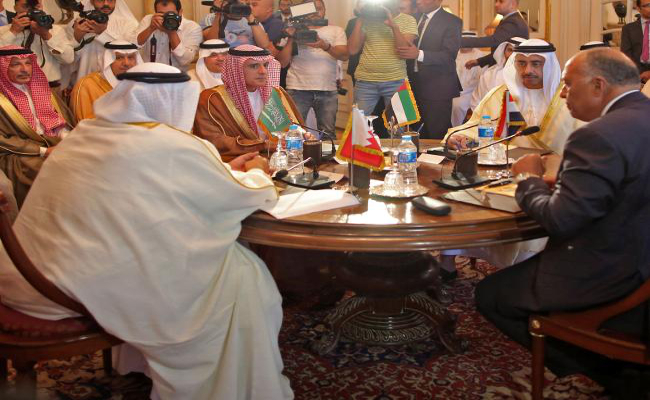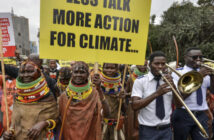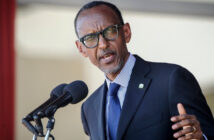The foreign ministers of Egypt, Saudi Arabia, Bahrain and the United Arab Emirates, meeting in Cairo, said in a statement they “regret the negative response from Qatar”, and vowed to continue its blockade.
Egyptian Foreign Minister Sameh Shoukry said Qatar’s response to the bloc’s conditions had “no substance” and “reflects a lack of understanding of the gravity of the situation”. The talks in Cairo came a month after the four countries severed ties with Qatar, accusing Doha of supporting extremism.
“The boycott will remain,” Saudi Foreign Minister Adel al-Jubeir said at the same news conference in the Egyptian capital. The four Arab states stopped short of announcing new sanctions but Jubeir said they would “take steps at the appropriate time”.
The UAE state minister for foreign affairs, Anwar Gargash, predicted more isolation for Qatar. “Next greater isolation, incremental measures & reputational damage stemming from Doha’s continued support for extremism & terrorism,” he tweeted.
The demands which included Doha the closing broadcaster Al-Jazeera is regarded by many as bullying, preposterous and unreasonable. Qatari Foreign Minister Sheikh Mohammed bin Abdulrahman Al-Thani said the list of demands “is unrealistic and is not actionable”, accusing the four countries of seeking to infringe on the nation’s sovereignty.
He yesterday hit back at the “inhuman and illegal” blockade and said the Arab states were using a “double narrative” to hide their true intentions. He said Saudi Arabia, the United Arab Emirates (UAE), Bahrain and Egypt had “carefully orchestrated an unprecedented smear campaign” to misrepresent Qatar’s policies to the world, telling an audience at London think-tank Chatham House: “The allegation that Qatar supports terrorism was clearly designed to generate anti-Qatar sentiment in the West.
“This manipulation has already and will continue to obscure the real source of violent extremism.” The other demands include Qatar downgrading ties with Iran — Saudi Arabia’s regional archrival — and shutting down a Turkish military base in the emirate.
In his phone call with Sisi, Trump “reiterated the need for all countries to follow through on their commitments at the Riyadh summit (in May) to stop terrorist financing and discredit extremist ideology,” the White House said. US Secretary of State Rex Tillerson spoke with the emir of Kuwait and stressed Washington’s “support” for his efforts to mediate a solution to the crisis, Kuwait’s KUNA news agency said.
Qatar has said repeatedly it is ready for talks on the crisis, and Sheikh Mohammed reiterated that on Wednesday. “We welcome any serious efforts to resolve our differences with our neighbours,” he said. The minister accused Saudi Arabia and its regional allies of “demanding that we must surrender our sovereignty as the price for ending the siege”.
The UN meanwhile said its undersecretary general for political affairs, Jeffrey Feltman, was in Kuwait for talks on ending the dispute. Germany’s Foreign Minister Sigmar Gabriel said in a statement that he was “pleased to see talks between (the US secretary of state) and the Kuwaitis”. “It is now a matter of the parties entering into negotiations,” he added.
Qatar is the world’s leading producer of liquefied natural gas. Its energy riches have transformed Qatar into one of the world’s wealthiest countries, a major international investor and a regional player that will host the 2022 football World Cup.




